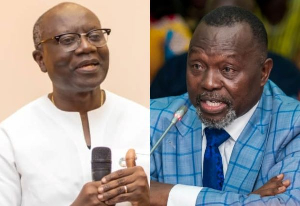S. Kwaku Asare
In reprimanding Blakk Rasta, the Speaker of Parliament, Mr. Doe Adjahoe, is reported to have said, “Parliament as an institution has the power to jail people who made contemptuous remarks or utterances about the House or MPs and … those who say we don’t have that power to sentence people can proceed to the Supreme Court when we decide to exercise that power. … Go and Sin no more.”
The Speaker’s words appear to have been carefully chosen and delivered to achieve 3 goals: (i) Deify Parliament; Intimidate the citizenry; (iii) Misinform the citizenry.
Go and sin no more, of course, is a biblical reference. Those words spoken by Jesus in John 5, 1-15 are meant to both extend mercy and demand holiness. With forgiveness comes the expectation that the forgiven sinner will not continue in the same path of rebelliousness.
Thus, when the Speaker recites the phrase “go and sin no more,” he intends to equate Parliament with a House populated by Lords with near divine power. In effect, Ghana’s House of the Lords! The goal here, apparently, is to instill obedience in the citizenry under the theory that all citizens are obliged to obey their Lords or to face their wrath. The Speaker is merely reminding us that as Lords they can be forgiving but they expect changed behavior and will not hesitate to strike if we continue in our sinful ways. In the divine words of Lord Samuel Atta Akyea, the MP for Abuakwa South, “Blakk Rasta should be handed a stiff punishment to put the fear of God into people who had taken Parliament for granted!”
The second goal is to intimidate the citizenry by dangling the sword of contempt at them. The Speaker seeks to emphasize that they, as Lords, have the power to jail the citizens, using processes determined solely and exclusively by them, if the citizens misbehave. Ultimately, this threat appears to be designed to reduce the citizens’ interest in holding the MPs and Parliament accountable. For if a citizen has to choose her words carefully when she talks about MPs or risk going to jail, most rational citizens will opt for silence. By intimidating the citizenry, the Speaker intends to resuscitate the culture of silence and usher in a new era of Parliamentary Detention Action (PDA). But whereas the abominable Preventive Detention Act was actually an Act of Parliament, this new PDA was just a divine revelation by the Lord Speaker.
The third goal is to misinform and engage in propaganda. The Speaker does not explain why he thinks they have the power to jail. Rather, he misappropriates that power and challenges those who think he (or Parliament) does not have the power to go to Court. Of course, you’d remember this as the approach used by the chairman of the Electoral Commission, which triggered the 2012 election petition. To paraphrase Justice Atuguba, it is easy to say go to Court but what is more useful is to do the right thing.
What then is the Right Thing?
It is abundantly clear and beyond disputation that Parliament and the Speaker do not have the power to send anyone to jail under any circumstances. Article 14 of the Constitution is abundantly clear that every person shall be entitled to his personal liberty and no person shall be deprived of his personal liberty except (a) in execution of a sentence or order of a court in respect of a criminal offence of which he has been convicted; or (b) in execution of an order of a court punishing him for contempt of court.
Neither the Speaker nor Parliament, as a body, has the power to issue a committal warrant. The Speaker and Members of Parliament will be committing a high crime if they attempted to or issued one. And for the avoidance of doubt, there would be no constitutional or statutory basis for the Minister of Interior or the Director of Prisons and their agents to comply with that warrant. The warrant will be a legal nullity!
The Speaker’s Oath
The Speaker’s oath requires him to uphold, preserve, protect and defend the Constitution. The question that arises is how can he do this when he does not understand the Constitution. The notion that it is only the Courts that can issue committal warrants is so basic and fundamental that anyone not knowing this is, in my opinion, not fit for the office of the Speaker.
Power to Punish for Contempt
The power to punish for contempt of Parliament is recognized by the Constitution. For a legislative body to be credible, it must have the power to provide and preserve the orderliness of its deliberative and decision-making process. The power exists to allow Parliament to carry out its work and aims at punishing actions that impede or obstruct the work of Parliament. The contempt power does not seek to protect the dignity of the Members of Parliament, although as ably argued by Professor H. Kwasi Prempeh, disorderly conduct by an MP can affront the dignity of Parliament. Nor does it exist to massage the egos of MPs or to shield them from criticisms of those who voted for them.
The standing orders of Parliament provide several examples of such obstructive conduct. For instance, a witness in parliament can be cited for contempt if she deliberately misleads Parliament or any of its committees. Law enforcement officials can be cited for causing or effecting the arrest of an MP or officer of Parliament during the proceedings of Parliament. Petitioners who present to Parliament frivolous, false, scandalous, groundless or fabricated documents or such allegations in a petition can be held in contempt. Media personnel who publish of false, perverted, misleading, distorted, fabricated or scandalous ?reports, books or libels reflecting on the proceedings in Parliament can be cited. So-called strangers can fall to the sword of Parliamentary contempt if they engage in disorderly conduct to hinder or promote the passing of a bill. Obviously, misconduct or corruption in the execution of official duties by Members or Officers of Parliament will be contemptible. Of course, any of these contemptible matters can be said to affront the dignity of Parliament.
The most important observation from this list is that all of these actions obstruct or impede the work of parliament. Another important observation is that the list does not target criticisms, insinuations, invective or insults directed toward MPs or even Parliament. To do so will be to interfere with political speech. ?
Political Speech
Political speech is the core expressive activity that forms the foundation of our democracy; it is the highest level of protected speech under the Constitution. This protection includes the unfettered right to criticize, even insult, our representatives. To hold citizens in contempt of Parliament for insulting their representatives is to subvert democracy!
Of course, this is not to endorse the use of insults or mindless allegations, such as the one made by Blakk Rasta, in the political, or for that matter any, space. This is only to say that the sword of contempt of parliament is not a permissible remedy. Ignoring, ostracizing, asking for retraction or instituting civil defamation cases are remedies that are available to any MP who feels one of his constituents has gone overboard. I would also add that Blakk Rasta’s allegation will be considered as political hyperbole and considered by most courts as non-libelous. In fact, but for Parliament’s needless overreaction, most of us would not have known who Black Rasta is, much less, know what he said on his Radio Talk show.
The Fourth Estate
According to the Constitution, all agencies of the mass media shall, at all times, be free to uphold the principles, provisions and objectives of this Constitution, and shall uphold the responsibility and accountability of the Government to the people of Ghana.
In furtherance of this freedom, “editors and publishers of newspapers and other institutions of the mass media shall not be subject to control or interference by Government, not shall they be penalized or harassed for their editorial opinions and views, or the content of their publications.”
This freedom is subject to only laws that are reasonably required in the interest of national security, public order, public morality and for the purpose of protecting the reputations, rights and freedoms of other persons.
It is important to observe that the freedom is not subject to laws preserving the independence of the judiciary as in the 1969 and 1979 Constitution and certainly not subject to preserving the dignity of Parliament.
Parliament enjoys absolute freedom of speech. But we have also empowered our media to hold Parliament accountable and in that enterprise we have given the media immunity from Parliamentary hazards. This highlights that the people of Ghana have decided that media personnel should be free to criticize, even ridicule, government officials without having to balance the fear that they would be held in contempt of Parliament. This clear policy choice is understandable given the desire of the citizenry to rid the country of the culture of silence.
In sum, the Speaker and Parliament have no power to jail anyone in Ghana.
Opinions of Wednesday, 29 July 2015
Columnist: Asare, Kwaku S.














